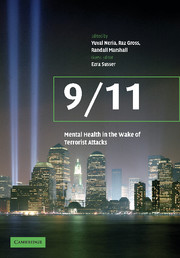Book contents
- Frontmatter
- Contents
- Acknowledgments
- Editors brief bio
- List of contributors
- Foreword
- Part I Introduction
- Part II The psychological aftermath of 9/11
- Part III Reducing the burden: community response and community recovery
- Part IV Outreach and intervention in the wake of terrorist attacks
- Part IV A New York area
- Part IV B Washington, DC
- Part IV C Prolonged-exposure treatment as a core resource for clinicians in the community: dissemination of trauma knowledge post-disaster
- 26 Psychological treatments for PTSD: an overview
- 27 Dissemination of prolonged exposure therapy for posttraumatic stress disorder: successes and challenges
- 28 Mental health community response to 9/11: training therapists to practice evidence-based psychotherapy
- Part V Disasters and mental health: perspectives on response and preparedness
- Index
28 - Mental health community response to 9/11: training therapists to practice evidence-based psychotherapy
from Part IV C - Prolonged-exposure treatment as a core resource for clinicians in the community: dissemination of trauma knowledge post-disaster
Published online by Cambridge University Press: 27 October 2009
- Frontmatter
- Contents
- Acknowledgments
- Editors brief bio
- List of contributors
- Foreword
- Part I Introduction
- Part II The psychological aftermath of 9/11
- Part III Reducing the burden: community response and community recovery
- Part IV Outreach and intervention in the wake of terrorist attacks
- Part IV A New York area
- Part IV B Washington, DC
- Part IV C Prolonged-exposure treatment as a core resource for clinicians in the community: dissemination of trauma knowledge post-disaster
- 26 Psychological treatments for PTSD: an overview
- 27 Dissemination of prolonged exposure therapy for posttraumatic stress disorder: successes and challenges
- 28 Mental health community response to 9/11: training therapists to practice evidence-based psychotherapy
- Part V Disasters and mental health: perspectives on response and preparedness
- Index
Summary
Introduction
The events of 9/11 continue to have profound consequences for the sense of physical safety and psychological well-being of Americans. In particular, as epidemiological research revealed the full magnitude of the mental health consequences of the 9/11 attacks (Galea et al., 2002), there was an unprecedented level of outreach aimed at insuring that those in need of mental health services are identified and treated (Felton, 2002). As part of this campaign, members of the general public were encouraged to examine their own distress levels and, if needed, to seek assessment and treatment.
These campaigns, and the public response to them, represent a sea change in attitudes toward mental health in our culture. The public discussion of the mental health consequences of 9/11 has been relatively free of stigmatizing and shaming attitudes that are often associated with mental health disorders. As noted by Jack Rosenthal, the Pulitzer Prize winning president of the New York Times Foundation, in the wake of 9/11, the word “victim” no longer held its pejorative connotation (J. Rosenthal, personal communication, 2001).
Of course, even with this reduction in stigma, many needing psychological help as a result of the events of 9/11 will still feel resistant to seek help. A survey by DeLisi and colleagues reported that only 27% of those with severe post-9/11 psychological symptoms were obtaining treatment (DeLisi et al., 2003). Nevertheless, even conservative estimates predict that over 100,000 persons could be expected to seek help for 9/11-related psychological trauma in the New York area alone (Herman et al., 2002).
- Type
- Chapter
- Information
- 9/11: Mental Health in the Wake of Terrorist Attacks , pp. 496 - 518Publisher: Cambridge University PressPrint publication year: 2006



